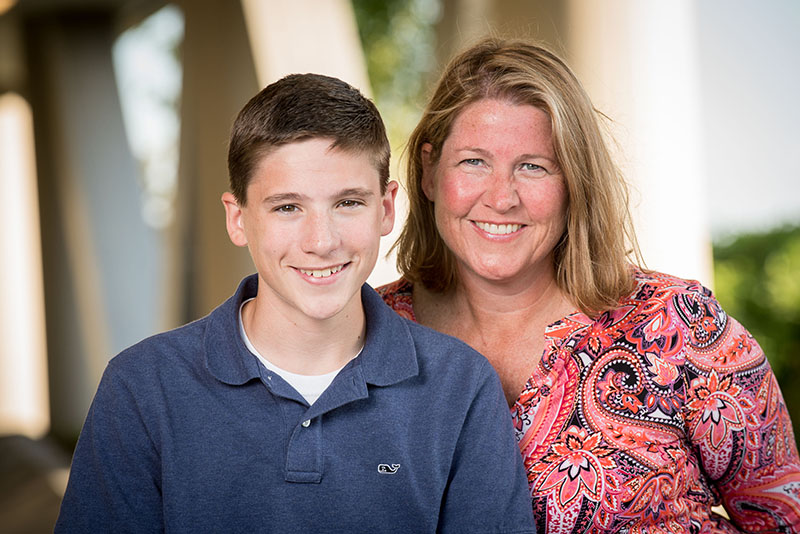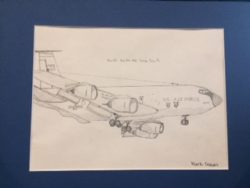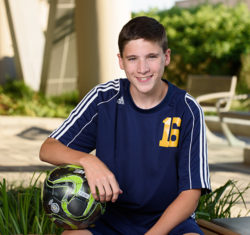Children's Emergency Department is now located in Children's Tower: 1001 E. Marshall Street.
Learn more
Now that he’s been cancer-free for 18 months, Gwendolyn Carnes says her son Mark, 15, is able to tell the start of his story in a somewhat lighthearted way: “I went to Chipotle Sunday afternoon (his favorite), then to the hospital. And we didn’t come home for two weeks.”
The summer before his eighth grade school year, Mark began experiencing stomach pain. He’d been an avid baseball player for years, but had decided to give soccer a try that summer. His parents initially assumed Mark’s pain was muscle-related due to his soccer training, but when the pain continued they brought him to his pediatrician’s office for blood work, x-rays and other testing. “There was not anything showing,” recalled Gwendolyn. “And he was not a kid who was sick often other than sometimes having allergies.”

Mark had been looking forward to an end-of-summer hiking and camping trip with the kids from his grade at school, but his stomach pain worsened so much in the next week that the Sunday before the trip, his parents brought him to a local emergency room. From there things progressed quickly: “In the ER, they spotted a mass in his stomach,” Gwendolyn said. “He was transferred to CHoR by ambulance on Monday and had surgery to remove the mass the next day.”
Doctors from our ASK Pediatric Hematology and Oncology Clinic confirmed that Mark had stage III Burkitt lymphoma just days after the surgery. Burkitt lymphoma is a rapid-growing, aggressive form of non-Hodgkin lymphoma, a type of cancer that originates in cells of the immune system. Symptoms often progress quickly, within days to weeks, and the abdomen is an area of the body where it often initially develops. “Those first two weeks were a blur,” said Gwendolyn.
While still hospitalized, Mark began chemotherapy as part of a treatment plan developed by a team of pediatric oncologists, nurse practitioners and specialists from CHoR and VCU Massey Cancer Center. Together, we are dedicated to the prevention, detection, treatment and survivorship of childhood cancers and blood disorders through compassionate clinical care backed by leading-edge research. Our center provides a level of cancer expertise and experience only found at the top four percent of cancer centers across the country that are designated by the National Cancer Institute.
Mark underwent intense chemotherapy for the next six months. Each rotation he would stay at the hospital for seven days of treatments, go home and recover for three weeks, then come back for seven more days of treatments. During this time Mark and his family spent many hours at CHoR. “We just fell in love with the physicians and nurses there,” Gwendolyn said. “We saw them so often and they are such a fine group of individuals. His doctors were fantastic and the nurses too. They are our lifelong friends forever.”

Drawing is something Mark has enjoyed throughout his life (airplanes and sports cars are his favorite subjects) and he often passed the time during treatments creating artwork for the nurses and doctors who cared for him. As they got to know him, members of his medical team soon began drawing pictures for Mark as well. One of his favorites was a sketch of an elephant drawn by a resident on his care team. This drawing became Mark’s “lucky elephant” and his family brought the drawing to the hospital each time he came to stay and hung it in his hospital room for luck.
Mark’s favorite subject is science – specifically physics – and he said it was very helpful to him that his doctors took the time to explain to him what was happening during his treatments. Becoming comfortable talking with your doctors is a piece of advice he’d offer to other kids facing similar challenges: “Take interest in your treatment,” he advises. “It makes it a lot more interesting if you ask questions and pay attention.”
Gwendolyn said that seeing how the care team interacted with Mark on such a personal level helped her cope with what her son was going through. “There’s nothing like having a child going through cancer,” she said, “but they distracted him when he needed it and they explained what was going on. His doctors were great about explaining the what, where and when of everything that was happening which was really helpful to Mark.”
Mark attends The Steward School in Richmond and one of his biggest fears during the six months of treatment was that he would miss a year of school. “He didn’t want to be left behind and not move on with his class,” Gwendolyn explained. “He loves school and is serious about his studies.”
Mark aspires to study aeronautical engineering someday – hopefully at the Air Force Academy (“Go Air Force!”). He wants to be an Air Force fighter pilot and fly F-35s. His teachers and tutors, he said, were “extremely helpful” throughout his treatments. His teachers came to the hospital and to his house to help him keep up with schoolwork. He also worked with tutors from the ASK Clinic during the times he was hospitalized. Mark’s school organized meals for his family, sent him weekly gift packages, and made banners and recorded videos. Their efforts, along with the many friends who visited him in the hospital and stayed in touch with notes and letters, were “most helpful” in ensuring he stayed connected and felt supported. Mark also appreciated the support from his family “who stayed with him every time he was at the hospital.”
 Mark’s last chemotherapy treatment was January of 2016. He returned to school the following month, able to finish his eighth grade school year with his class. This year he’s a rising tenth grader, still at The Steward School, continuing to work toward his plans for the future. He’s back to being able to play soccer and participate in other sports and activities he enjoys, including tennis, lacrosse and mountain biking. Video games are a favorite pastime as well, and Mark recently built his own desktop computer that can be used for gaming. He’s also enjoying some time for teenage fun and recently saw is favorite band, Twenty One Pilots, in concert.
Mark’s last chemotherapy treatment was January of 2016. He returned to school the following month, able to finish his eighth grade school year with his class. This year he’s a rising tenth grader, still at The Steward School, continuing to work toward his plans for the future. He’s back to being able to play soccer and participate in other sports and activities he enjoys, including tennis, lacrosse and mountain biking. Video games are a favorite pastime as well, and Mark recently built his own desktop computer that can be used for gaming. He’s also enjoying some time for teenage fun and recently saw is favorite band, Twenty One Pilots, in concert.
Mark continues to come to CHoR every three months for checkups with his oncologist Dr. Christina Wiedl to make sure the cancer doesn’t return. “It gets better,” is Mark’s other – and very hopeful – piece of advice for other kids facing a similar medical situation. “It keeps getting better until it’s a thing of the past.”
It goes without saying that Mark and his family are thrilled that chemotherapy is now a thing of the past for him. With his thoughtful, scientific nature, Mark is very aware of everything that went into getting him there. “At the beginning and end of every seven-day treatment, Mark had chemotherapy in his spine,” Gwendolyn said. “The spine is a place where Burkitt likes to hide and Mark knows that it’s because someone else went through this experience that his doctors know things like this. Throughout all of the treatments and protocols, he often repeated how thankful he was to others who went through this before. He’s very appreciative of his doctors and nurses as their understanding and knowledge of science and medicine literally saved his life.”